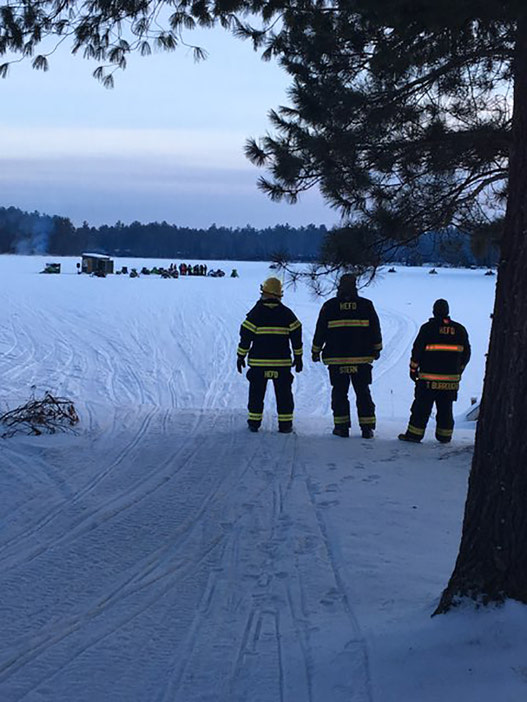Highlands East firefighters will soon have a long-awaited opportunity to use community fundraised dollars to get ice-rescue training.
The Ontario Fire College will offer an ice-rescue course starting in February for the first time since 2014. The Highlands East fire department has awaited a fire marshall-approved course to utilize $18,562 raised via a GoFundMe campaign in 2017 after a cottager fell through the ice of Dark Lake.
Acting fire chief Chris Baughman said the fire department is municipally regulated as shore-based only but he would bring the matter to council once the course is in place.
“The money is still there for that purpose,” Baughman said. “It would cover us to buy a basic kit to do the in-water rescue and the training for five to six firefighters. My intention year-after-year is to add a couple more firefighters to that list.
“It wouldn’t cover the whole fire department but it would certainly give us a good start.”
Ice-rescue training in the province was complicated by a 2017 inquest into the deaths of Adam Brunt and Gerry Kendall, who died during such training. At inquest recommendation, the Office of the Fire Marshall and Emergency Management put ice and cold water rescue programs on hold.
But now the Ontario Fire College will offer a revised course, according to Ministry of the Solicitor General spokesperson Brent Ross. He said the course will be open to all firefighters across the province and will also take place at regional training centres.
Other local fire departments are also examining the course. Algonquin Highlands fire chief Mike Cavanagh said they will try to get the program approved to be available locally.
“As with our other training programs all County Fire Departments will be working together to deliver the required training to meet each department’s needs,” he said.
In the meantime, there is some inconsistency in which local fire departments can do ice rescues. Highlands East and Dysart et al are shore-based but Algonquin Highlands can do ice rescues, per respective municipal policies.
Cavanaugh said AH firefighters have trained using the old ice rescue standard for many years, which has let them maintain that training. But departments looking to get into ice water rescue have had to wait for a new program.
There are private courses around the province that have offered ice-rescue training while the Ontario Fire College lacked a program. Baughman said there are liability concerns with ice rescue and he wanted to wait.
“Without an approved training program, how can I guarantee they’re getting the proper training if there’s not a program to follow?” Baughman said. “I would rather wait for an approved course.”





